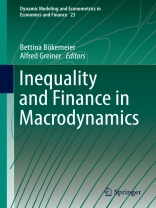This contributed volume combines approaches of the current inequality debate with aspects of finance based on profound macroeconomic model analyses. Research on inequality has had a long tradition in economics. With the financial crisis from 2007, not only output decreased tremendously, but also inequality has risen since then. The book presents selected contributions of a workshop held at Bielefeld University in 2016 and features additional papers written by experts in the field. A mixture of established researchers and young scholars presents both theoretical and empirical frameworks to analyze the subject.
Table des matières
Inequality in Germany and the US: An Introductory Note.- Assessing Public Spending Efficiency in 20 OECD Countries.- Government Debt, Fiscal Rules and Singular Growth Dynamics.- Financial Liberalization, Inequality and Inclusion in Low-Income Countries.- On (Non-)-Neutrality of Public Debt in Growing Economies.- Financial Intermediation and Directed Technical Change.- Sustainability of Public Debt in an AK Model with Complex Tax System.- Demographic Change and the Rates of Return to Risky Capital and Safe Debt.- Financing Sustainable Growth through Energy Exports and Implications for Human Capital Investment.- Macroeconomic Risk, Fiscal Policy Rules and Aggregate Volatility in Asymmetric Currency Unions: A Behavioral Perspective.- Asset Accumulation with Heterogeneous Households – the Rise of Wealth Disparity.












